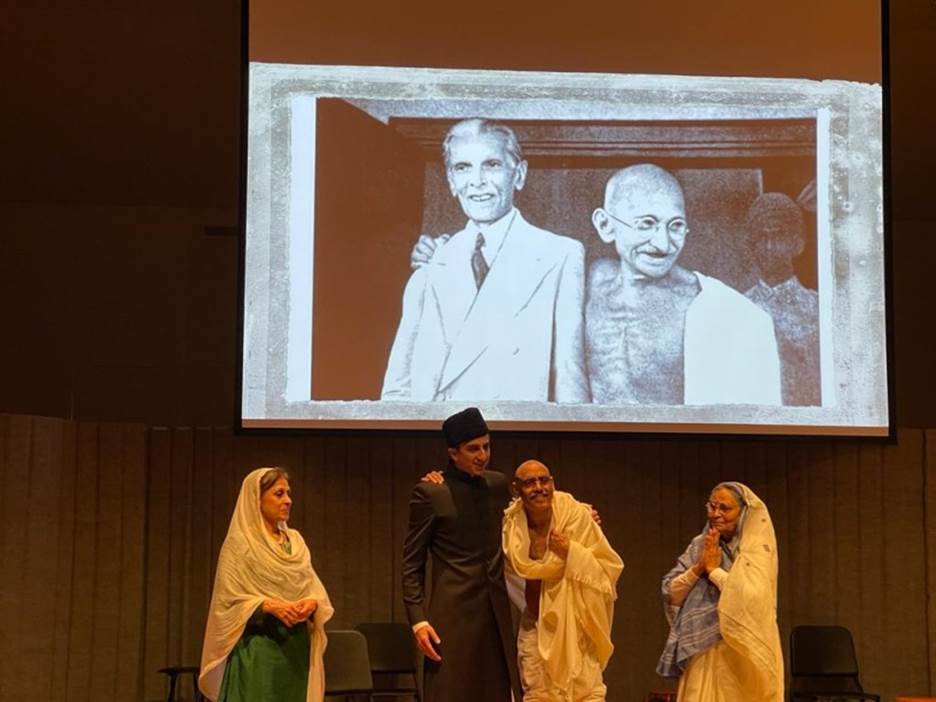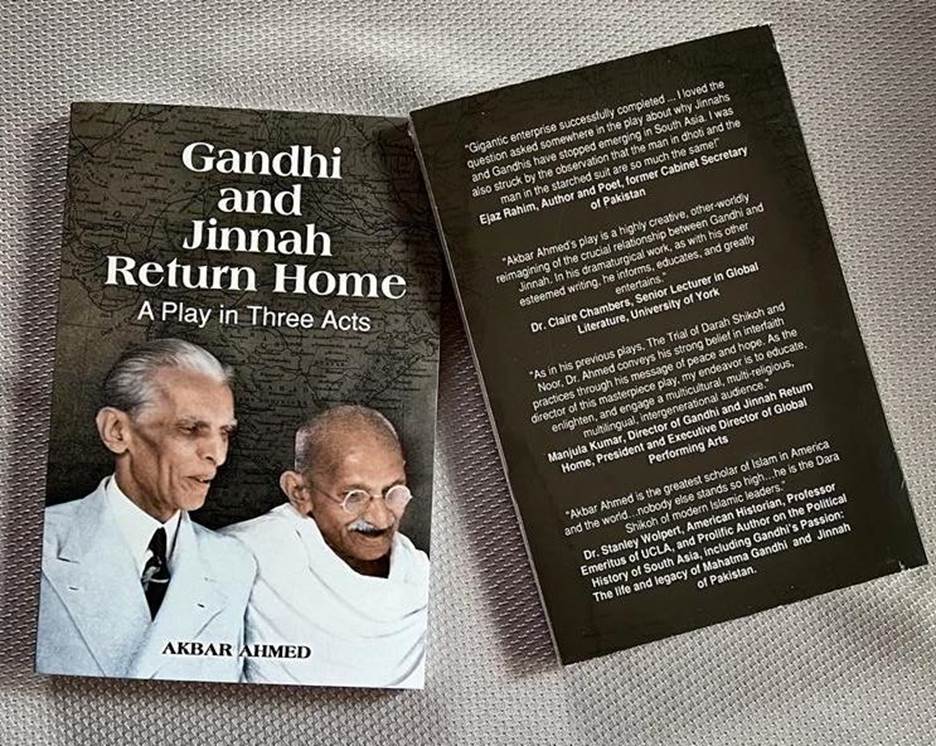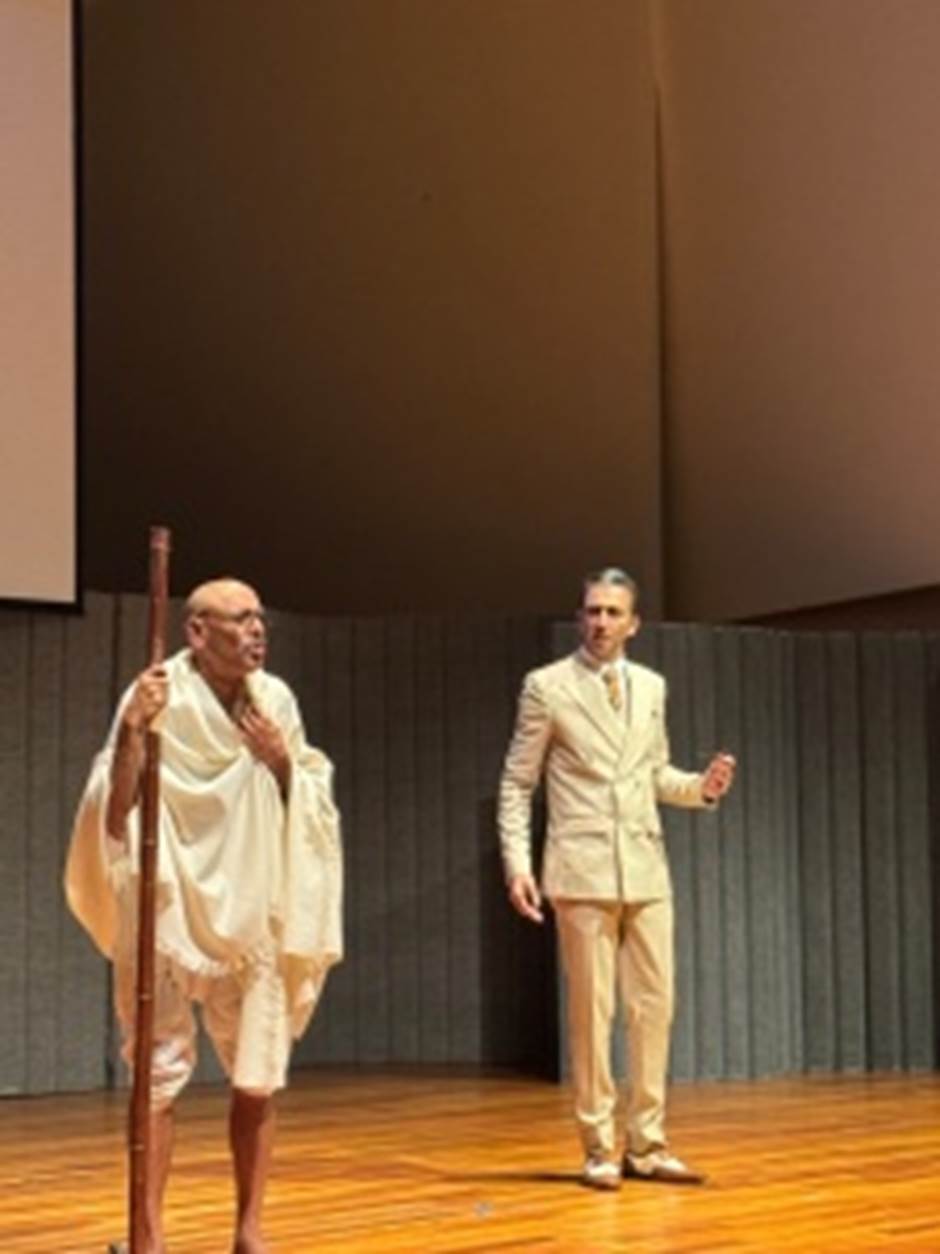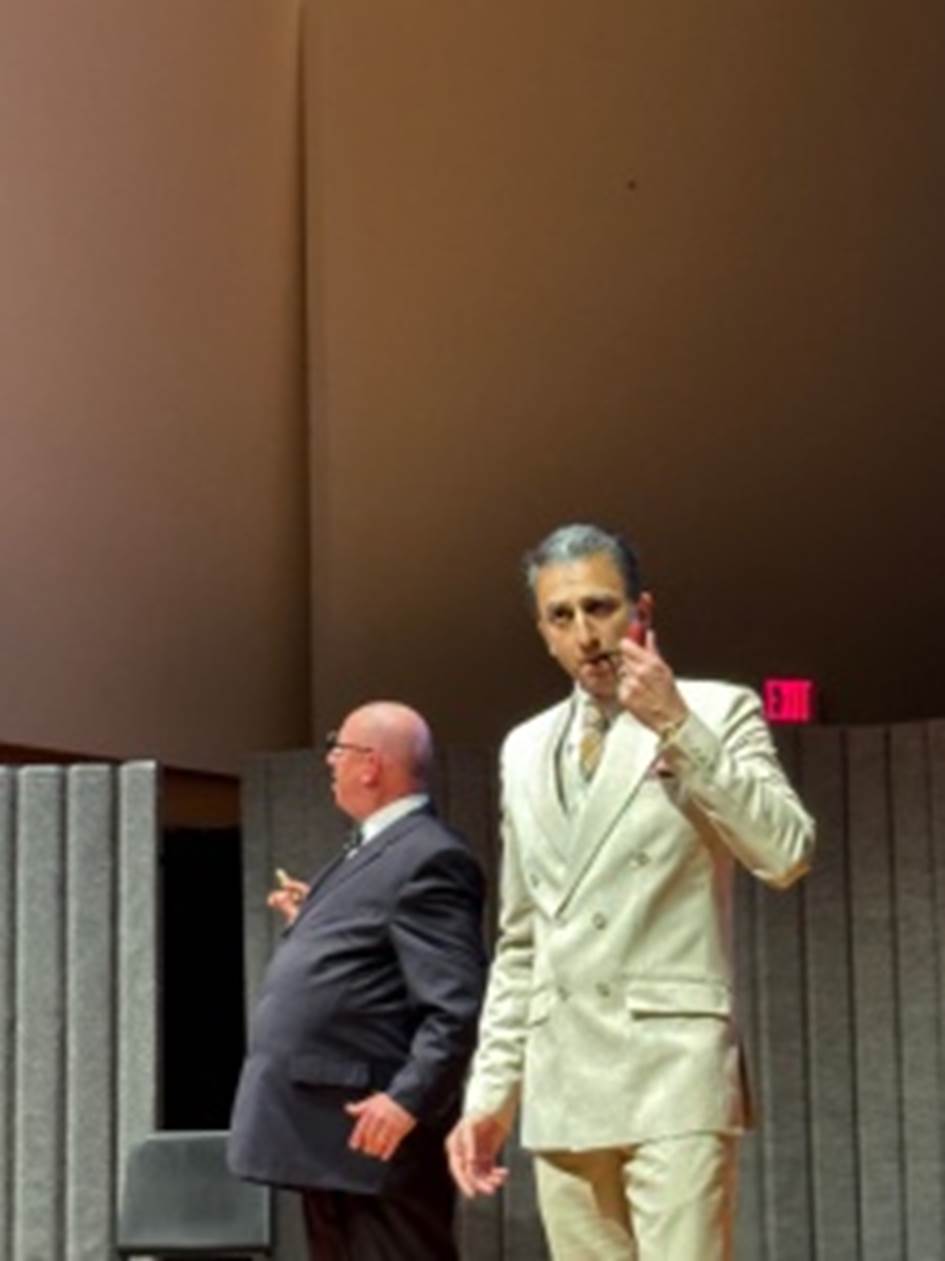
L-R: Sujata Avasthi as Fatima Jinnah, Farhan Bhaba as Muhammad Ali Jinnah, Sri Mirajkar as Mahatma Gandhi, Nisha Narayan as Kasturba Gandhi - Photo credit Rohan Singh
Peacebuilding on Stage: ‘Gandhi and Jinnah’ Embrace in Washington DC
By Sher Afgan Tareen
Florida
“I have grandchildren and I want them to live in peace,” is how the Islamic scholar and former diplomat Dr Akbar Ahmad responds to the query about his motivation for writing the play “ Gandhi and Jinnah Return Home .”
A prominent interfaith advocate , Dr Ahmed has held distinguished posts in academia and public service for over four decades, including as Pakistan High Commissioner to the UK and Ireland. He is currently the Ibn Khaldun Chair of Islamic Studies at American University, Washington DC, and a Global Fellow of the Wilson Center.
It was at a panel discussion on Human Rights, Democracy and Identity in South Asia , two days before the play premiered at American University last month, where the discussion moderator Tamanna Salikuddin, Director of South Asian Programs, US Institute of Peace (USIP), asked Dr Ahmed about his motivation for writing “yet another play.”
Attending online from South Florida, where I am currently based, I looked up his earlier stage plays: “Noor” (2007), “The Trial of Dara Shikoh” (2009), and “Waziristan to Washington” (2009), a monologue based on his own life.
Dr Ahmed has also done various projects on Pakistan’s founder, Mohammad Ali Jinnah, including the film Jinnah (1998) starring Christopher Lee. I remember watching it as a nine-year-old in a cinema in Karachi with my mother. Dr Ahmed co-scripted the film with director Jamil Dehlavi.
Meena Kumari

Book cover: Gandhi and Jinnah Return Home (Pakistan Link publications, 2023)
The Gandhi-Jinnah play, published in book form by Arif Mansuri , Pakistan Link Publications (2023), has been staged at venues across Washington DC since its premiere at American University, directed by Manjula Kumar , who is also a former project manager at Smithsonian’s Center for Education and Museum Studies. Other venues in the area include the Cultural Arts Center, Montgomery College, Silver Spring, and the Black Rock Center for the Arts in Germantown. Additionally, the play has been performed at the prestigious Cosmos Club , directed by Hugh Hill, an emergency physician, attorney, and theatre professional.
At the panel discussion, Dr Ahmad recalled how he and his contemporaries grew up listening to their elders talk about the partition of India in 1947. They grieved those who died while crossing the newly formed border in the largest mass migration in human history and rejoiced at the aspirations of those who got to live in a free nation.
Panelists included Manjula Kumar and three cast members: Farhan Bhaba, playing Jinnah; Sri Mirajkar, playing Gandhi; and Soumya Kini, playing a journalist and human rights activist named after Akbar Ahmad’s favorite Bollywood actress, Meena Kumari.
Kumar foregrounded the role of emotion in peacebuilding. Reading the script, she was struck by how all the characters undergo an experience of emotional purification followed by a collective feeling of grief – a catharsis, to use the Greek term.
The Greek Dionysian tragic drama is deeply associated with the Indian drama tradition, noted Kumar.
Looking into this, I found that Ohio State University professor of philosophy and literature Dana Munteanu explores this in her book Tragic Pathos (Cambridge University Press, 2011).
Processing tragedy through collective grief is a far cry from the modern trend of watching “images of violence alone” on television. Such isolationism may, in the long run, be a greater threat to society than the violence itself, suggested Kumar.
It struck me that effective peacebuilding might entail engaging with our emotions and managing them in a perpetually conflict-ridden world rather than aiming for a world without conflict.

Sri Mirajkar as Mahatma Gandhi, Farhan Bhaba as Muhammad Ali Jinnah - Photo credit Rohan Singh
Processing tragedy
Looking into this issue further, one finds that the use of theater as a form of storytelling to process tragedies is on the verge of collapse , as highlighted by Isaac Butler, author of The Method: How the Twentieth Century Learned How to Act (Bloomsbury Publishing, 2022).
Since the late seventies, the widespread neglect of arts education in the United States , Pakistan , India , and elsewhere has left an emotional chasm that drains empathy and promotes narcissism .
Prominent philosopher Martha Nussbaum argues that arts education and the humanities sustain democracy . When the former erodes, the latter corrodes. A National Endowment for the Arts study corroborates this, revealing that deep engagement with the arts in and out of school ensures academic excellence and cultivates a passion for volunteerism and civic engagement.
The vacuum created by the sidelining of literature, music, dance, and theater is filled by social media platforms that amplify polemicists and muzzle storytellers. The ensuing polarization also spills onto higher education institutions, including campus protests . Today, such activism is fracturing the student body into warring tribes .
Against this backdrop, the staging of Dr Ahmed’s “Gandhi and Jinnah Return Home” in the Washington DC area offered a rare opportunity to witness peacebuilding at play.
In one of the play’s scenes, Jinnah and Gandhi resurface to debate the costs of partition alongside contemporary Indians and Pakistanis. After many rounds of dialogue, the two embrace one another.
A message of peace
Curious about the audience response, I emailed the organizers and heard back from Rohan Singh, a student of Dr Ahmed’s at the Islamic Studies Department at the School of International Service, American University. Singh, who is also a cast member, shared some student feedback.
Some were struck by the vibrant presence of women in a play named after two men. Meena Kumari, played by Soumya Kini, is a journalist passionate about human rights who compels Gandhi and Jinnah to address every controversial topic during their debate, including nuclear armament. Her fearless pursuit of truth shatters Gandhi’s and Jinnah’s pride in their standpoint and nurtures a sense of vulnerability to actively engage with opposing viewpoints.
Forgiveness for the past is a leitmotif in various encounters in the play, said Singh, and the audience gained compassion and understanding for the constraints faced by these larger-than-life figures.
Such theatre serves as a reminder of the need to promote the arts and humanities. Pursuing a degree in the humanities leads to prosperous careers, as Dr Amanda Furiasse, an Assistant Professor of the Digital Humanities and Medical Humanities at Nova Southeastern University, writes in a recent piece for Women in Higher Education. Her argument discredits popular perceptions of the arts as merely a financial drain.

L-R: Peter Poggioli as Sir Winston Churchill, Farhan Bhaba as Muhammad Ali Jinnah
Her critique is bolstered by the rich background of the play’s cast members. Sri Mirajkar is the president of a consulting firm interested in environmental sustainability. Nisha Narayan, who plays his wife, is a teacher passionate about amplifying women’s voices in progressive movements. Farhan Bhaba runs an agribusiness and has a range of hobbies from food security to arts. Soumya Kini is a public health researcher and a budding pianist who composed a short piece for the play “Churchill’s Melancholy.” Farrukh Iqbal, who plays the law professor, is an economist who retired from the World Bank. Rohan Singh, the youngest cast member, has interned at the US Mission to the UN Human Rights Council.
Drawing a connection between his passion for the arts and peacebuilding, Singh described the play as an “artistic way to spread the message of peace which can sometimes be more effective as it can reach a larger audience.”
The last performance of the play took place on Friday, December 1, at the Greenberg Theatre, American University. It provides an opportunity to witness a cathartic reenactment of South Asia’s tragic past. And I am left wondering if such theatre productions could yield a path towards imagining a more peaceful future in conflict-riddled regions worldwide?
(Sher Afgan Tareen is a historian of religion who specializes in the study of 20th century Islam in America. His research interests lie at the intersection of religion and feminism, exploring insights from Muslim practices of motherhood to understand the interplay between intelligence and emotional cognition and developing culturally responsible technologies. Originally from Quetta, Pakistan, he is based in South Florida. Email: skt932@mail.harvard.edu)
– This is a Sapan News syndicated feature.

